By Tom Tracy - Florida Catholic
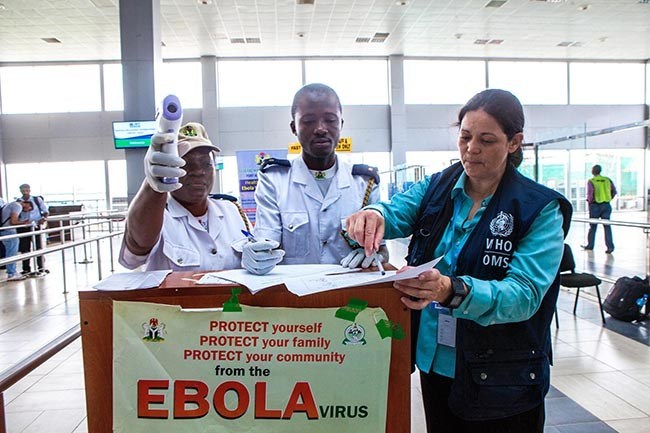
Photographer: COURTESY PHOTO| FIU
Dr. Aileen Marty at an Ebola primary screening station at Lagos International Airport.
MIAMI| Dr. Aileen Marty, a former U.S. Navy doctor and expert in infectious diseases, including anthrax, said the West African outbreak of the deadly Ebola virus will be contained only if all ports of entry in the region are adequately screening for infected carriers.
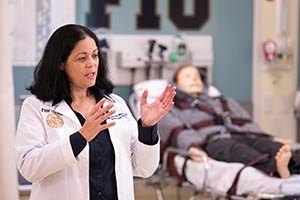
Photographer: TOM TRACY | FC
After one month in Nigeria, serving with the World Health Organization�s Global Outbreak Alert and Response Network, Dr. Aileen Marty, professor of infectious diseases at the Miami-based Florida International University, speaks about her experience with Ebola in West Africa and provided her assessment of the threat going forward.
Dr. Marty, who spoke with the media on Sept. 22, a week after her return to the U.S., said WHO officials have been particularly worried that if Ebola gained a foothold in Nigeria -- with its large urban population and the region�s largest economy -- the results would be globally devastating.
An estimated 5,000 West Africans have already been infected with the Ebola disease that has killed approximately 2,500, including one Liberian-American man who in July reportedly imported the virus into Nigeria. That patient died in Nigeria along with several others who later became infected.
�One individual flew into Nigeria, the most populous country in Africa, by far, with an overwhelming impoverished population and that led to a social and economic crisis as well as a personal tragedy for a number of individuals,� said Dr. Marty, a Cuban-American and class of 1975 alumnus of Our Lady of Lourdes Academy, an all-girls archdiocesan high school in Miami.
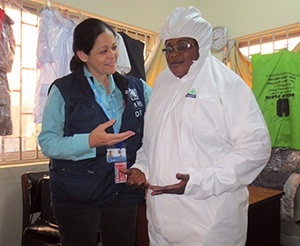
Photographer: COURTESY PHOTO| FIU
Dr.Aileen Marty at Tincan Seaport with Adebesin Modinay who was fully suited as a preventive for hazardous diseases like Ebola virus.
Originally, she had planned on being sent to the hard-hit region of Sierra Leone, but after the first cases of Ebola virus were reported in Nigeria the WHO redirected her there.
She personally screened an estimated 1,000 possible carriers of the virus, including numerous that were later confirmed.
Recounting some of the ramifications from that one imported case of Ebola into Nigeria, Dr. Marty said, �the entire country was affected, schools were closed, industry was affected, trade was affected, tourism was affected, sports were affected and people are now afraid of Nigerians all because one individual in one airplane brought this disease to that country.
�Therefore, taking care of the points of entry where you enter and exit the country became an absolute imperative, and still is -- while the outbreak rages on in Liberia, Sierra Leone and Guinea, you have to maintain vigilance at the points of entry in these countries,� Dr. Marty said.
Nigeria is better prepared for that now, she added, due to recent efforts to boost screening procedures at the country�s international airports and seaports, �but land ports were a lot harder because for every legal land border crossing there are a dozen more illegal border crossings so that became a campaign of dealing with the (tribal) chiefs and encouraging them to see why it was in their interests to control the movement of ill individuals across their borders.�
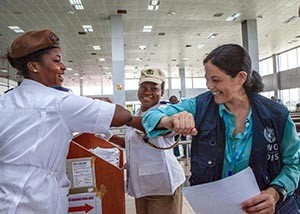
Photographer: COURTESY PHOTO| FIU
Safer than shaking hands, Dr. Aileen Marty bumps elbows with a Lagos International airport employee.
�We looked for a (traveler screening) system that would be very sensitive but not necessarily very specific and since it wasn�t very specific we expected a number of false positives, but that is a safer thing for the world.�
Since religious beliefs in Nigeria are diverse, the WHO media team also did some public awareness outreach to the churches there.
�Had Ebola spread among the impoverished people of Nigeria it would have been a world calamity. It can be brought under control but it does take a lot of resources and a lot of equipment,� Dr. Marty said.
Coming home, Dr. Mary admitted she was not impressed with what she saw as a weak screening at airports in Europe and the United States. She observed that a plane full of passengers from West Africa arriving in Europe did not get much scrutiny.
�Certainly when I landed in Europe, on an entire plane coming from a county that has Ebola, it probably would have been a good idea to at least do rudimentary questions and screenings of people getting off the flight and that they get tracked wherever they are going,� she said.
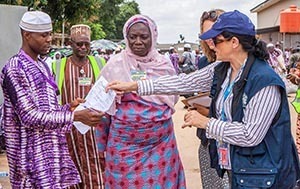
Photographer: COURTESY PHOTO| FIU
Dr. Aileen Marty (right) distributes forms to World Health Organization volunteers.
As she has traveled on special assignments in some 50 countries, Our Lady of Lourdes Academy has supported her. In 2007 the school presented her with the Outstanding Career Achievement Bernadette Award for her distinguished research and work on infectious diseases, including the study of biological weapons such as anthrax and sarin.
Her alma mater has also allowed her to remain close to her graduating class, especially a group of 12 classmates from Our Lady of Lourdes Academy who playfully call themselves �The Dirty Dozen.�
Martica Castellanos, alumni director at Lourdes Academy, said another of Dr. Marty�s classmates from 1975 is singer and Miami native Gloria Estefan, who is also part of the alumni group that meets frequently.
�I have a lot of contacts with my class because we were a very close year in 1975 and we had a lot of wonderful people who graduated that year and we really care for each other,� she said. �There are 12 of us trying to get together regularly once a month; even when I lived all over the place I tried to come back to the meetings.�
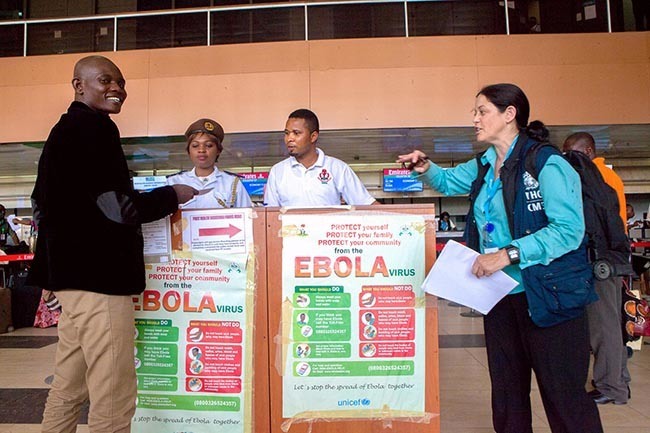
Photographer: COURTESY PHOTO| FIU
Dr.Aileen Marty (right) at an Ebola virus screening station at the Lagos Airport.

